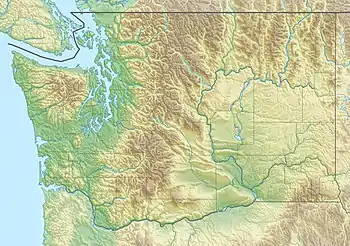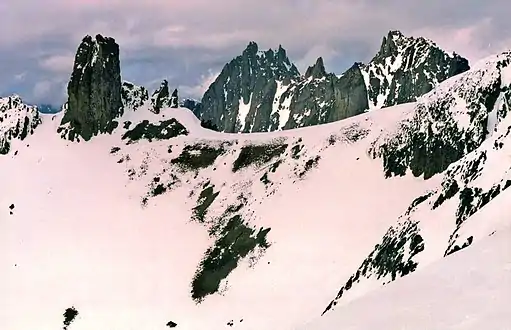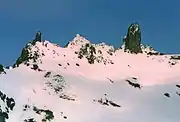| Gilhooley Tower | |
|---|---|
 Gilhooley Tower | |
| Highest point | |
| Elevation | 7,480 ft (2,280 m)[1] |
| Prominence | 120 ft (37 m)[1] |
| Coordinates | 47°48′58″N 123°14′14″W / 47.816135°N 123.237232°W[1] |
| Geography | |
 Gilhooley Tower Location of Gilhooley Tower in Washington  Gilhooley Tower Gilhooley Tower (the United States) | |
| Location | Jefferson County, Washington, US |
| Parent range | Olympic Mountains |
| Topo map | USGS Mount Deception |
| Geology | |
| Age of rock | Eocene |
| Type of rock | basalt |
| Climbing | |
| First ascent | 1963 by Donald Anderson, Harold Pinsch, Joyce Pinsch[2] |
| Easiest route | Climbing class 4 |
Gilhooley Tower is a basalt spire in the Olympic Mountains and is located in Jefferson County of Washington state. It is situated in Olympic National Park on the Olympic Peninsula. Its nearest higher peak is Mount Deception at 0.13 mi (0.21 km) to the southeast.[1] Precipitation runoff drains into tributaries of the Dungeness River and Dosewallips River.
Climate
Gilhooley Tower is located in the marine west coast climate zone of western North America. Most weather fronts originate in the Pacific Ocean, and travel northeast toward the Olympic Mountains. As fronts approach, they are forced upward by the peaks of the Olympic Range, causing them to drop their moisture in the form of rain or snowfall (Orographic lift). As a result, the Olympics experience high precipitation, especially during the winter months in the form of snowfall. During winter months, weather is usually cloudy, but, due to high pressure systems over the Pacific Ocean that intensify during summer months, there is often little or no cloud cover during the summer. Because of maritime influence, snow tends to be wet and heavy, resulting in high avalanche danger.
Gallery
 Gilhooley Tower at far left. Mount Johnson centered, and Martin Peak to right
Gilhooley Tower at far left. Mount Johnson centered, and Martin Peak to right Gilhooley Tower to right
Gilhooley Tower to right
References
- 1 2 3 4 "Gilhooley Tower". Peakbagger.com.
- ↑ "First Ascents – Climbers Guide to the Olympic Mountains". climbersguideolympics.com. Retrieved 2018-07-31.
External links
- "Olympic National Park". National Park Service.
- Gilhooley Tower weather: Mountain Forecast